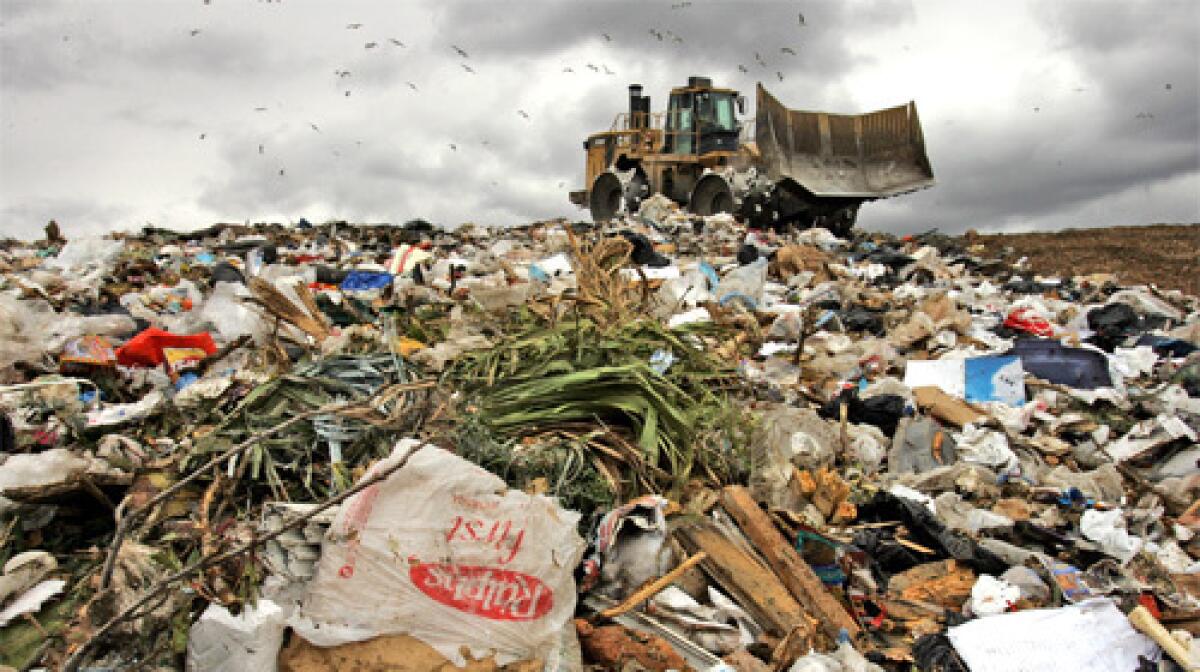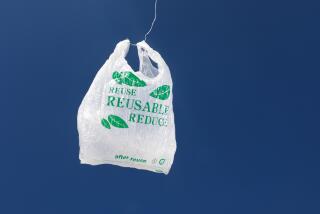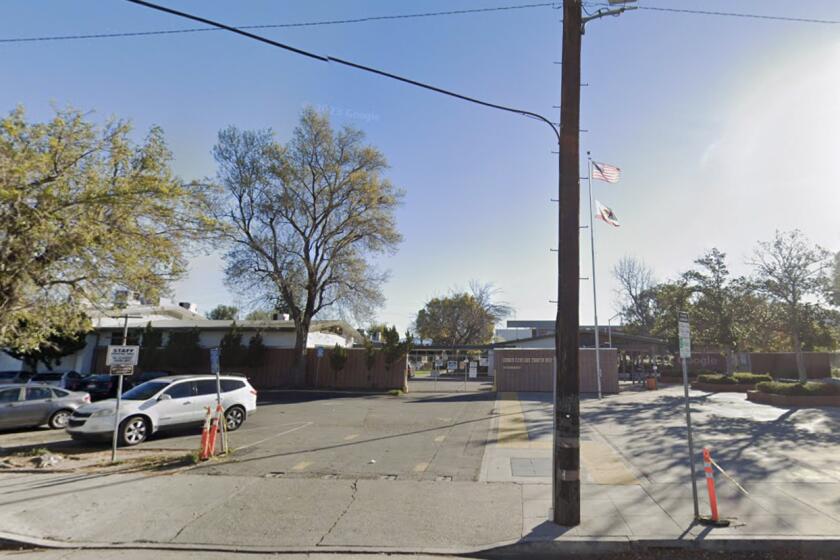Plastic-bag ban unravels

Los Angeles County supervisors backed off a threat Tuesday to ban plastic shopping and grocery bags that environmental experts call unsightly and destructive.
Instead, officials chose the weakest of five alternatives recommended by county executives: a volunteer program that leaves it to supermarket and store owners to coax customers into packing their purchases in reusable containers.
FOR THE RECORD:
Plastic bags: An article in Wednesday’s California section about a Los Angeles County initiative regarding plastic bags described the alternative that supervisors agreed upon, to impose a ban on the bags only if supermarkets do not meet specified benchmarks by 2013, as the weakest of five alternatives. It was among the weaker of the five alternatives, one of which was to take no action. —
The action was a scale-back from a year ago, when supervisors ordered county lawyers to look into drafting a ban on non-recyclable bags altogether, much as San Francisco did.
But their action Tuesday was only the latest example of how the supervisors sometimes react when faced with difficult issues: strong rhetoric at the outset, followed by prolonged study, then a weakened or shelved initiative.
“If you spend nine months negotiating on something and [the supervisors’] original position is a flat-out ban of bags and it continues to be nickeled and dimed, you basically have death by a thousand cuts and at the end of the day, are you solving the environmental problem?” said Mark Gold, president of Heal the Bay.
Following San Francisco’s landmark ban, supervisors sought to adopt the policy, arguing that the county’s 6 billion plastic bags harm marine life and litter neighborhoods.
“When you hear that sort of bold pronouncement from the board, of course we’re going to work with them,” Gold said. “It was the dawn of a new day.”
But the 90-day study that supervisors promised in April 2007 stretched into nine months, as grocers and retailers weighed in. By July, the California Grocers Assn., which represents 500 retailers in California and Nevada, had hired a lobbying firm. Records show that by December, the group had paid Rose & Kindel more than $33,000.
Indeed, with county executives prepared to seek only the voluntary measure, a last-minute amendment was offered days before Tuesday’s vote, lowering the bar for grocers and retailers even further. The final product approved by supervisors: A ban would be adopted only if the use of bags in unincorporated Los Angeles County did not decrease at least 30% by July 2010 and at least 65% by July 2013.
Some supervisors said Tuesday that it was the best compromise that could be reached in an arena filled with passionate opinions and alternatives that would have cost businesses millions of dollars.
“Fortunately, democracy is the art of compromise,” said Supervisor Zev Yaroslavsky, who along with Supervisor Gloria Molina voted against the amendment. “Politically, the landscape is not conducive to a ban. So we worked to get the next best thing.”
Tuesday wasn’t the first time that compromises led to weakened or killed initiatives.
In April 2006, supervisors hailed a $100-million plan to open five regional homeless shelters that would provide a one-stop shop for transients -- many of them on downtown Los Angeles’ skid row -- to get medical care and social services.
“It ought to be recognized for what it is: an absolutely historic investment by the county of Los Angeles,” Yaroslavsky told The Times nearly two years ago. “We’ve got some momentum politically to do something about this . . . and it may be an opportunity that will not pass our way again.”
But 18 months later, pressure from cities unwilling to accept the shelters ripped the plan apart. Local officials feared that the plan would only shift the homeless problem to their neighborhoods.
“They fell prey to NIMBYism and some of the tough talk that came from the regional municipalities,” said Orlando Ward, director of public affairs for the Midnight Mission in Los Angeles.
“I know that instance was a time for the county to really step up in unison and say, ‘You know what, we have the worst homeless problem in the country, it’s time to show some real leadership and say we’re going to do what’s right regardless the political blow-back we might get,’ ” Ward said.
On another front, supervisors last March called for mandatory hepatitis vaccines for employees in all 25,000 eateries in the county after a series of outbreaks at restaurants and catered events.
Although county executives cautioned that the policy would be a massive undertaking, possibly involving more than 100,000 food workers, supervisors went ahead with their announcement.
“We need to ensure that those who are involved in the handling of food are safe and healthy,” Supervisor Mike Antonovich announced at the time. “The public is vulnerable.”
Two months later, a county health report concluded that the supervisors lacked the authority to require the vaccine.
And in May 2007, supervisors proposed a ban on environmentally harmful foam food containers used by restaurants and stores in the county’s unincorporated areas.
Supervisors Yvonne B. Burke and Molina ordered county officials to study the possibility of eliminating polystyrene containers from county buildings, as well as outlawing them in food-service and retail stores. That study is still pending, said a spokesman for Burke.
Polystyrene does not break down in county landfills, and like plastic bags, clogs drains and litters roadsides.
One month before the announcement, the Plastic Food Service Packaging Group hired the same firm used by the grocers association to lobby against the measure.
Through September 2007, county records show that the company had spent $65,500 trying to influence the county’s policy.
More to Read
Start your day right
Sign up for Essential California for news, features and recommendations from the L.A. Times and beyond in your inbox six days a week.
You may occasionally receive promotional content from the Los Angeles Times.






